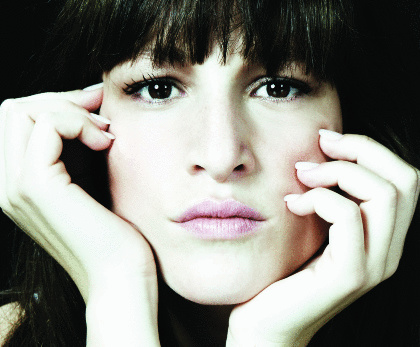- country:Portugal
- style(s):Fado
- label: EMI Germany
- type:Band
- artist posted by:Prime Tours & Promotion GmbH
Links
“I may not know who you are – but I know who I am.”
Yes, she does. It couldn't be any other way: she can sing these words from the heart, because she has always known that to sing Fado was her destiny, but she wouldn't commit to it before she knew who she was and who she could be.
Three years ago, Carmo Rebelo de Andrade, Carminho short, released her first album. “Fado” was its name, “Fado” was what her heart yearned for. She had grown up listening to the Fado records that her parents had at home, or the Fado meetings they organised, since her mother, Teresa Siqueira, was herself a singer. She started to sing it while yet a teenager. And all those who'd heard Carminho knew how good she was, and how far she could go singing it. But she wanted to know more about herself first – so she went to college, traveled the world, grounded herself in life. Then she came back and gave all of her to Fado.
“Fado” had been long awaited. And it became one of the most acclaimed debuts in the recent history of this most Portuguese of genres, the genre that made Amália and Mariza and Cristina Branco into worldwide stars. First, Portugal surrendered: “Fado” went Platinum (a remarkable result in this day and age, let alone for a debut album). Then the world: Songlines named “Fado” its best album of 2011; Carminho performed all over Europe, at Womex 2011 in Copenhagen, at UNESCO in Paris while Portugal was promoting Fado's candidacy to Immaterial World Heritage status. Spanish heartthrob Pablo Alborán invited her for a duet, “Perdoname”, on his latest album (with a swooning video shot in Lisbon) and the song became an instant chart-topper throughout the Latin countries.
Now, finally, Carminho has a new album ready to roll. March 5th sees the release of “Alma” - “Soul”, a title that reflects just how much Carminho pours herself into her singing. Reunited with the same team that accompanied her in “Fado”, led by producer Diogo Clemente, Carminho's sophomore album combines material both classic and new. There are cover versions of Fados created by other singers, like Amália Rodrigues, Maria Amélia Proença or Fernanda Maria, but also of songs written by the great Brazilian songwriter Chico Buarque and by Vinicius de Moraes, one of the fathers of Bossa Nova. And among the new material written specifically for this album, there are also new settings of the traditional Fado modes over which Carminho sings her own words or those of poets like António Gedeão.
A combination of past and present that points towards the future of one of the most outstanding and heartfelt voices Fado has revealed in its current flourishing. With “Alma”, Carminho proves, once and for all, that she knows who she is. And we are privileged to hear her sing so.




